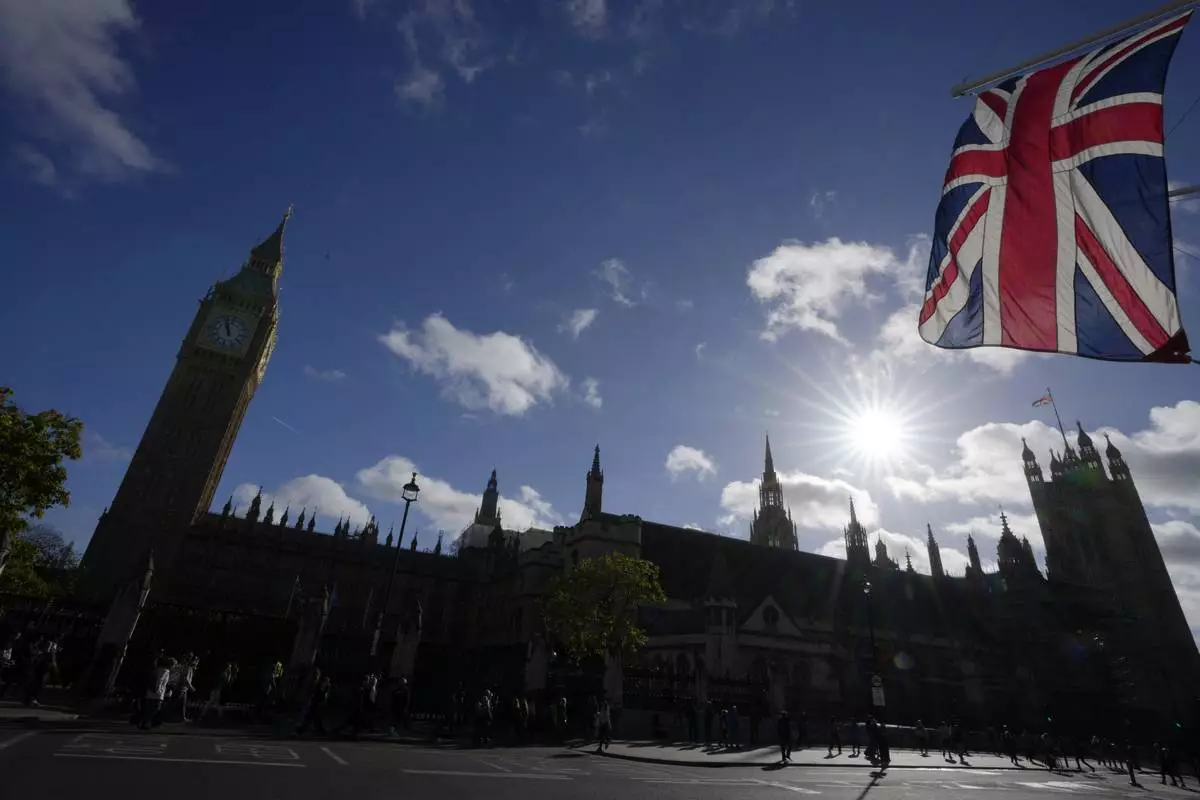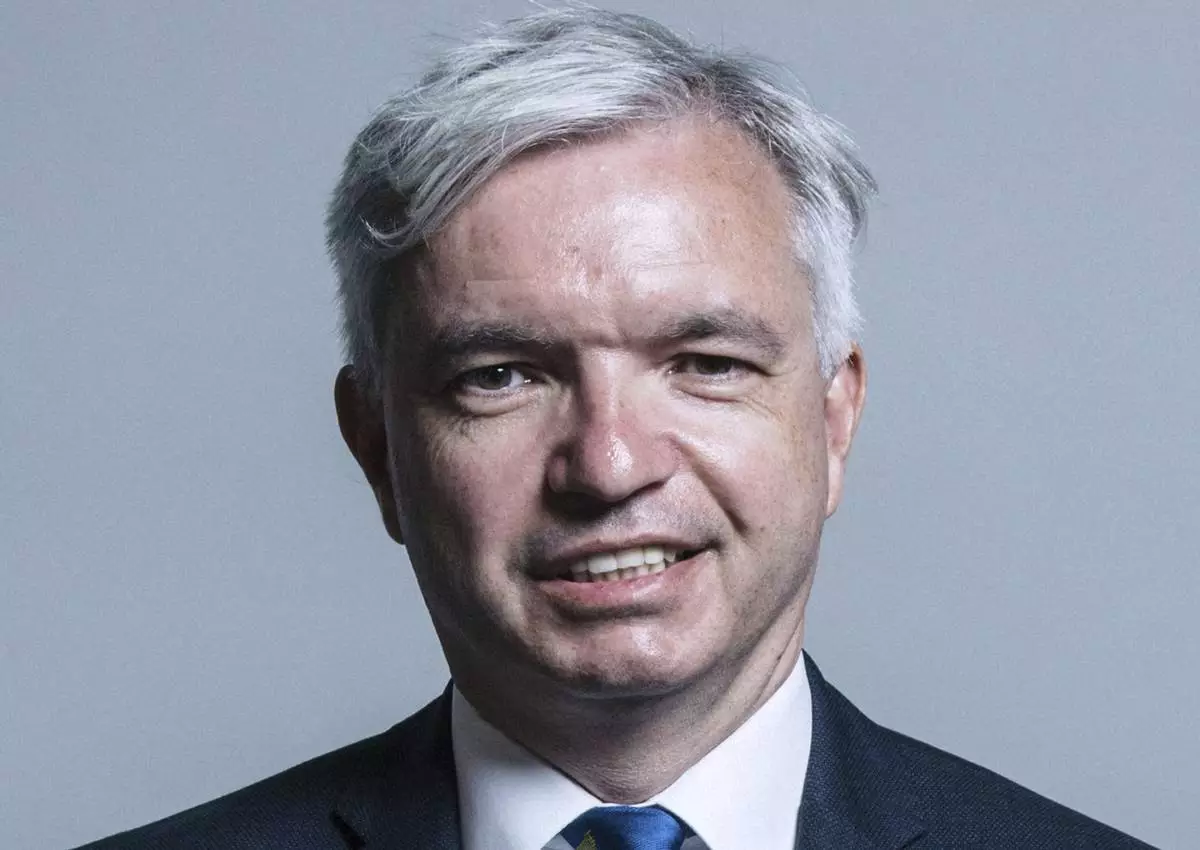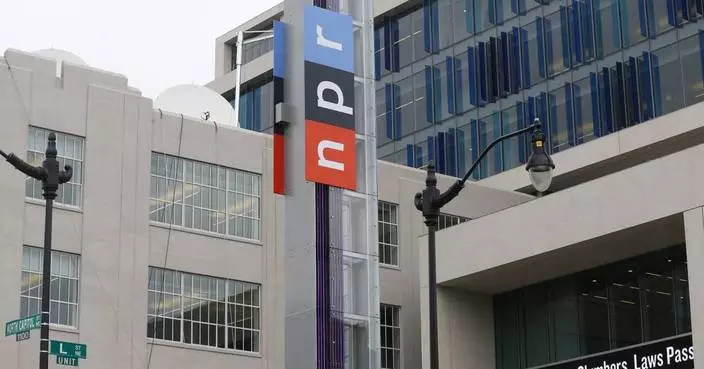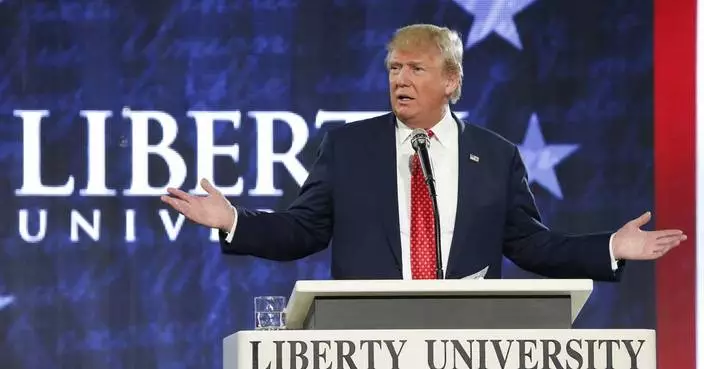Ivan Duque, the young conservative protege of a powerful former president, was elected Colombia's next leader Sunday after promising to roll back a fragile peace accord that has divided the South American nation.
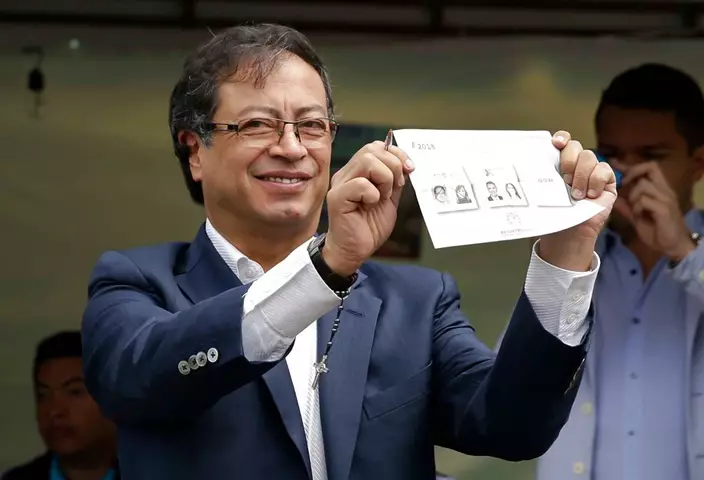
Gustavo Petro, presidential candidate for Colombia Humana, shows his ballot during the presidential election in Bogota, Colombia, Sunday, June 17, 2018. Voters will choose between Petro, a leftist former guerrilla and Ivan Duque, a young conservative lawmaker in a presidential election to decide who will lead Colombia as it implements a still-fragile peace accord. (AP Photo/Martin Mejia)
Duque captured almost 54 percent of the vote, putting him 12 points ahead of former leftist guerrilla Gustavo Petro in a tense runoff election that had appeared to be tightening in recent days.
In the end, the prematurely graying 41-year-old sailed to victory, promising to change parts of the accord with leftist rebels but not "shred it to pieces" as some of his hawkish allies had been urging.
When he takes office in August, Duque will be Colombia's youngest president in more than a century.
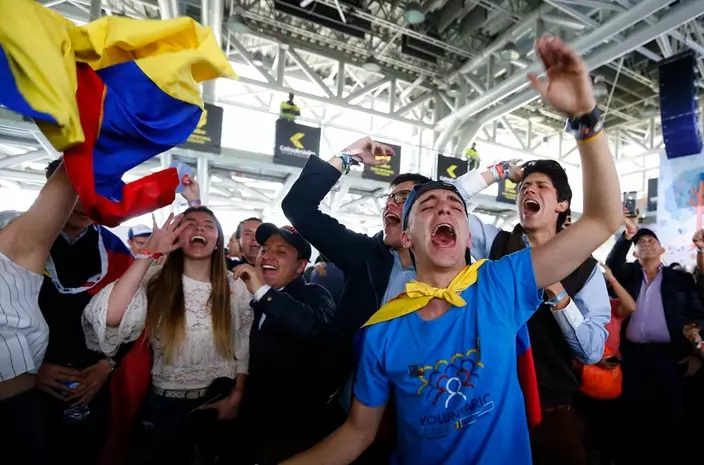
Supporters of Ivan Duque, candidate of the Democratic Centre party, celebrate the incoming results of the presidential runoff election in Bogota, Colombia, Sunday, June 17, 2018. A preliminary count of nearly 85 percent of voting center reports indicates Duque has a lead of 13 percentage points over Petro. (AP Photo/Fernando Vergara)
"The peace we all dream of demands corrections," he told hundreds of jubilant supporters. "So that victims are the true center of the process and so that there is justice, reparations and no repetition."
The new president will inherit a country still scarred by five decades of bloody armed conflict and grappling with soaring cocaine production. Former guerrillas of the Revolutionary Armed Forces of Colombia are struggling to reinsert themselves in civilian life in a nation where many people remain hesitant to forgive. Vast swaths of remote territory remain under the control of violent drug mafias and residual rebel bands.
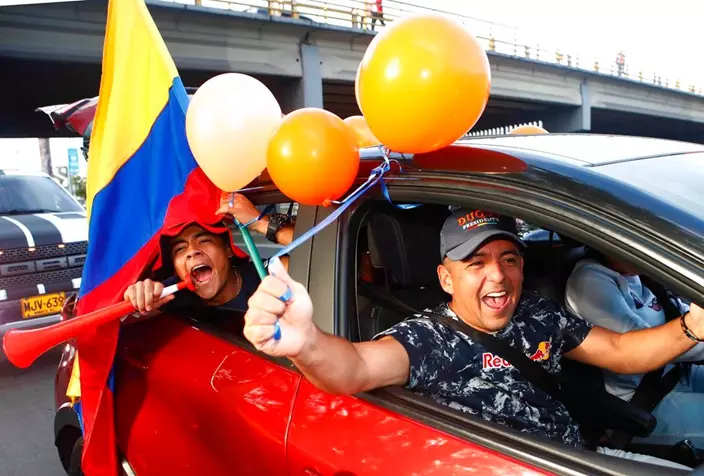
Supporters of Ivan Duque, candidate of the Democratic Centre party, celebrate the incoming results of the presidential runoff election in Bogota, Colombia, Sunday, June 17, 2018. A preliminary count of nearly 85 percent of voting center reports indicates Duque has a lead of 13 percentage points over Petro. (AP Photo/Daniel Munoz)
"Undoubtedly, for the peace process, this is an important test," said Patricia Munoz, a professor of political science at the Pontifical Xavierian University in Bogota.
It was the first presidential election since the signing of the 2016 peace agreement ending Latin America's longest-running conflict and was ultimately just as much about the divisive accord as it was deeply entrenched issues like persistent corruption and high levels of enduring inequality.
Petro energized young voters and drew millions to public plazas with his fiery speeches vowing to improve the lives of poor, disenfranchised Colombians.
And though he failed to catch Duque, his more than 8 million votes marked the biggest ballot box success for a leftist presidential contender yet in a country where leftist politicos have long been stigmatized over fears of potential ties to guerrilla causes.
"Perhaps as time passes people will be less scared about voting for left-wing politicians," said Jorge Gallego, a professor at Colombia's Rosario University. "Although with this result, it's proven that Colombia is still a right-wing country."
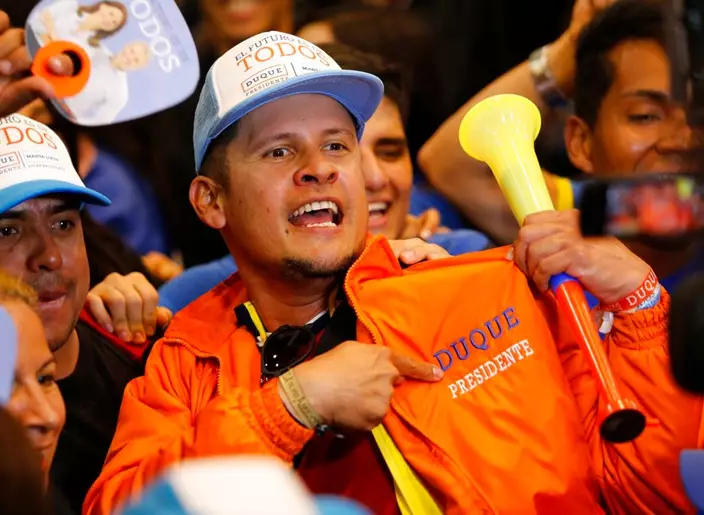
Supporters of Ivan Duque, candidate of the Democratic Centre party, celebrate his victory in the presidential runoff election in Bogota, Colombia, Sunday, June 17, 2018. Duque, the young conservative protege of a powerful former president, was elected Colombia's next leader after promising to roll back a fragile peace accord that has divided the South American nation. (AP Photo/Fernando Vergara)
Petro took his loss in stride, refusing to call it a defeat and saying that "for now" he and his supporters won't form a government — echoing the words used by socialist revolutionary Hugo Chavez following his failed 1992 coup against Venezuela's government. Six years later Chavez was elected president, setting the stage for a surge of the left throughout Latin America.
He challenged Duque to break with his hard-line allies and promised to transform his considerable following into a vocal opposition that would push for social reforms and stand by the peace accord.
"Those eight million Colombians are not going to let Colombia return to war," Petro said to a thunderous applause from supporters chanting "Resistance!"
Colombia's peace process to end a conflict that left more than 250,000 people dead is considered largely irreversible. Most of the more than 7,000 rebels who have surrendered their weapons have started new lives as farmers, community leaders and journalists. Last year the rebels launched a new political party and will soon occupy 10 seats in congress.
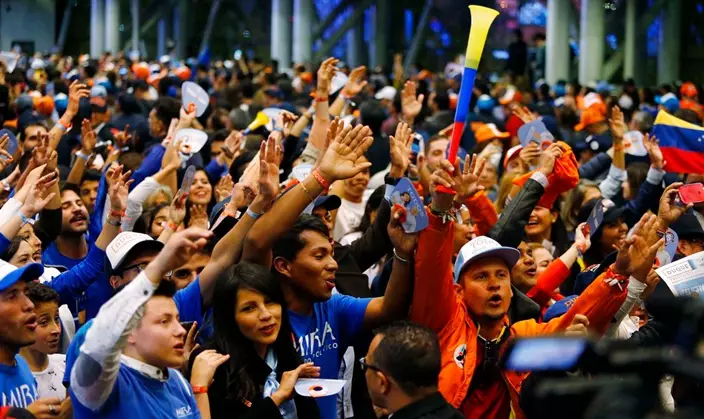
Supporters of Ivan Duque, candidate of the Democratic Centre party, celebrate his victory in the presidential runoff election in Bogota, Colombia, Sunday, June 17, 2018. Duque, the young conservative protege of a powerful former president, was elected Colombia's next leader after promising to roll back a fragile peace accord that has divided the South American nation. (AP Photo/Fernando Vergara)
But the accord remains contentious and Duque pledged throughout his campaign to make changes that would deliver "peace with justice." Through constitutional reform or by decree, he could proceed with proposals such as not allowing ex-combatants behind grave human rights abuses to take political office until they have confessed their war crimes and compensated victims.
The current agreement allows most rebels to avoid jail, a sore point for many.
"The rebels are going to get 10 seats in congress without having made reparations to victims or turned over information on drug trafficking routes," said Felipe Ramirez, 29, a veterinarian who voted for Duque. "That's a bad precedent because other criminal groups will want the same."
Duque's detractors warn that his victory could throw an already delicate peace process into disarray.
"I think it will set up a big constitutional battle," said Cynthia Arnson, director of the Latin America program at the Woodrow Wilson International Center for Scholars.
Duque is the son of a former governor and energy minister who friends say has harbored presidential aspirations since he was a child. The father of three ago entered public service almost two decades as an adviser to then Finance Minister Juan Manuel Santos, whom he will succeed as president.
Duque later moved to Washington, where he spent more than a decade at the Inter-American Development Bank, first as an adviser for three Andean countries and later as chief of the cultural division.
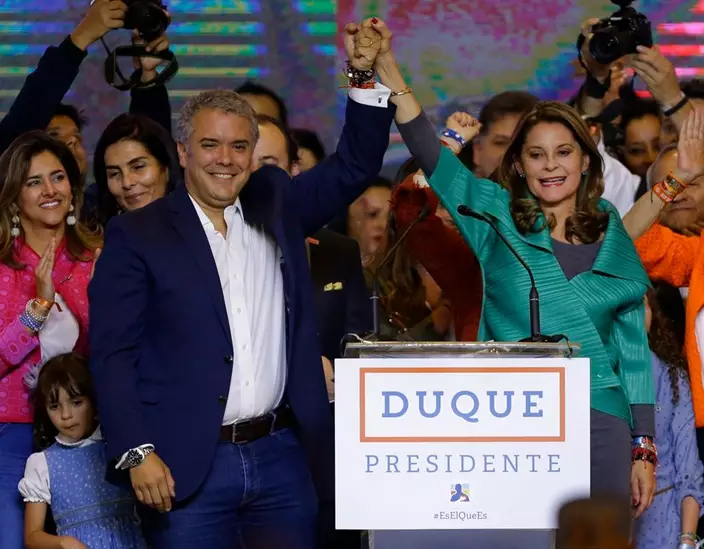
Ivan Duque, left, candidate of the Democratic Centre party, celebrates his victory with his running mate Martha Lucia Ramirez, in the presidential runoff election in Bogota, Colombia, Sunday, June 17, 2018. Duque defeated Gustavo Petro, a former leftist rebel and ex-Bogota mayor. (AP Photo/Fernando Vergara)
It was during that time that Duque forged a close relationship with former President Alvaro Uribe, the torchbearer of conservatives who is both adored and detested by legions of Colombians.
With Uribe's backing, Duque was elected to Colombia's Senate in 2014. Seated beside his mentor in the opulent Senate chamber, Duque earned a reputation as a like-minded security hawk who did his homework and earned the respect of colleagues across the political spectrum.
Throughout his campaign, Duque was dogged with accusations that he would be little more than a puppet for Uribe, who is constitutionally barred from seeking a third term.
Though praised for boosting Colombia's economy and weakening the FARC, Uribe presided over the government at a time when military officers killed thousands of civilians who were then dressed up as rebels to inflate body counts in exchange for vacations and bonus pay.
Critics fear Uribe will use his leverage over his star pupil to retaliate against political enemies and sideline investigations against him and his family for suspected ties to right-wing paramilitaries. Duque's supporters say that he will chart his own course.
In his victory speech, Duque said he would strive to bridge the divisions generated by the peace process and be a president for all Colombians. He added that he wants to see rank-and-file guerrilla members succeed in their transition to civilian life and become part of a growing Colombian economy.
"This is the opportunity that we have been waiting for," he said. "To turn the page on the politics of polarization, insults and venom."



